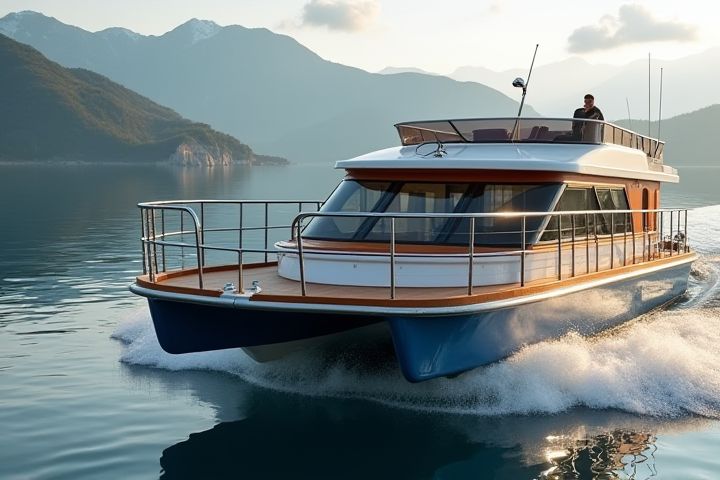
Houseboat insurance is specifically designed to cover various risks associated with owning a houseboat, including damage from storms, fire, or theft. Most policies also offer liability coverage in case of accidents, protecting you financially if someone is injured while on your property. When selecting a policy, consider factors such as location, the boat's value, and the level of personal property coverage you need. Some insurers may require safety features, such as life jackets and fire extinguishers, to qualify for full coverage. Be sure to compare quotes from different providers to find the best plan tailored to your needs.
Can You Insure A Houseboat
Insurance Coverage Options
Houseboat insurance typically offers several coverage options to protect your investment, including hull insurance, which covers damage to the vessel itself, and liability coverage that protects you against potential claims for bodily injury or property damage to others. Many policies also provide personal property coverage, safeguarding your belongings inside the houseboat. You can choose options for uninsured/underinsured boater coverage, which is crucial if you encounter issues with other boaters without sufficient insurance. It's essential to assess your specific needs and discuss available options with your insurance provider to ensure comprehensive protection for your houseboat.
Liability Protection
Liability protection for your houseboat is essential, especially if you frequently host guests or partake in water activities. Many insurance providers offer policies that safeguard against bodily injury or property damage claims, with coverage limits typically ranging from $100,000 to $1,000,000. It's important to review your policy for specific exclusions, such as water sports accidents or environmental damage, which may not be included. Ensuring you have adequate liability coverage can provide peace of mind and financial protection against unforeseen incidents on the water.
Comprehensive Coverage
Comprehensive coverage for a houseboat typically protects against various risks, including fire, theft, vandalism, and severe weather damage. Insurers often evaluate the houseboat's value, location, and safety features, which can influence your premium; for example, insuring a houseboat valued at $100,000 might cost between $1,000 and $2,500 annually. You may also consider liability coverage, which safeguards against accidents or injuries that might occur on or around your houseboat. To optimize your policy, review each provider's terms, as coverage specifics and limits can vary significantly.
Collision Coverage
Collision coverage for houseboats protects against damage from collisions with other vessels or fixed objects, ensuring your investment remains secure. This insurance type typically covers repairs needed after an accident, whether it's a minor scrape or a significant impact. In some cases, you may also be protected from liability if you cause damage to another boat or property. Your houseboat's value, location, and usage will influence the policy's cost and coverage limits.
Theft and Vandalism Protection
Houseboat insurance can provide valuable protection against theft and vandalism, ensuring that your investment is safeguarded. Policies typically cover stolen property, including electronics, equipment, and personal belongings, offering reimbursement for losses incurred. Additionally, coverage may extend to damages from vandalism, helping you pay for repairs and restoration. When choosing a policy, evaluate the specifics of coverage limits and deductibles to ensure your houseboat is adequately protected against potential threats.
Watercraft Endorsement
Insuring a houseboat typically requires a watercraft endorsement to your homeowners or watercraft insurance policy. This endorsement covers specific risks associated with houseboats, such as hull damage, liability protection, and personal property loss. For instance, policies may vary, but coverage limits often range from $50,000 to $500,000, depending on your needs and the boat's value. Ensure that your policy includes provisions for theft and natural disasters, as these situations can significantly impact your investment.
Navigational Limits
Insuring a houseboat involves understanding the specific navigational limits set by your insurance provider. These limits typically define the geographic areas where your houseboat can operate, affecting coverage and premium rates. Many insurers require that the houseboat remains within certain waterways or coastal regions, as exceeding these boundaries may result in reduced coverage or claim denial. Before purchasing a policy, it's essential to discuss your intended navigational routes with your insurer to ensure your coverage aligns with your boating plans.
Seasonal vs. Year-Round Policy
Insuring a houseboat involves selecting between a seasonal or year-round policy based on your usage patterns. A seasonal policy is ideal for those who only utilize their houseboat during specific months, potentially offering lower premiums but limited coverage during off-months. Year-round policies cater to frequent users, providing comprehensive protection throughout the entire year, including liability, theft, and damage coverage. Assess your boating habits and the risks involved to determine which option best suits your lifestyle and financial needs.
On-Water Towing and Assistance
You can insure your houseboat with policies that often include on-water towing and assistance, vital for preventing costly emergencies. Coverage typically encompasses services such as fuel delivery, battery jump-starts, and minor repairs, ensuring safety while navigating waterways. Many insurance providers offer tailored packages that cater specifically to recreational boating needs, enhancing your peace of mind during maritime excursions. By securing this coverage, you ensure prompt assistance, allowing you to enjoy your time on the water without stress.
Personal Property Coverage
Insuring a houseboat often includes personal property coverage, which protects your belongings against risks like theft, fire, or water damage. This coverage typically extends to furniture, electronics, clothing, and recreational gear stored on the houseboat, ensuring you can recover financially if your possessions are harmed. Many insurers also offer policies that can customize coverage limits based on the value of your personal property, allowing you to select an appropriate plan. Understanding the specific exclusions and conditions of the policy is crucial to ensure your personal items are fully protected while enjoying life on the water.
